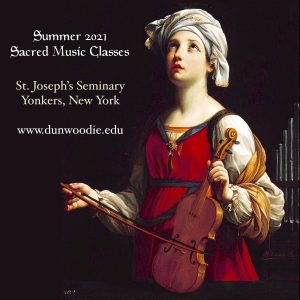 St. Joseph’s Seminary and College in Yonkers, New York is happy to announce this summer’s robust program, featuring eight graduate-level courses in sacred music and liturgy to be offered online during the summer 2021 session.
St. Joseph’s Seminary and College in Yonkers, New York is happy to announce this summer’s robust program, featuring eight graduate-level courses in sacred music and liturgy to be offered online during the summer 2021 session.
Download the brochure, with an FAQ and more information, here.
June 1–July 25 – Principles of Sacred Music
3 credits or audit, taught by Dr. Jennifer Donelson-Nowicka, 8 weeks asynchronous online + 2 days synchronous online via Zoom, July 26 and 27, 9 a.m. to 5 p.m. EST
Through a survey of the history of sacred music and reading of Church and papal legislation on sacred music, students gain an understanding of the principles which shape Western sacred music and the musical structure of the Roman rite. Special focus is placed on current documents which govern music in the Church. The course also features in-depth discussion of practical issues including the formation and management of sacred music programs in parishes, active participation, progressive solemnity, the use of instruments in the sacred liturgy, resources available for music directors and choristers, and other relevant topics. 3 credits or audit.
June 1–July 13 – Introduction to Liturgy
3 credits or audit, taught by Fr. Nicholas Zientarski, synchronous via Zoom, Tuesdays and Thursdays, 6:30–9:30 p.m. EST
This course will explore the theological, historical, and pastoral dimensions of the sacred liturgy. The history of the liturgy of the Roman rite, the role of ritual and symbol, the principles and norms articulated in the Second Vatican Council’s Constitution on the Sacred Liturgy, and the theology of the Liturgy of the Hours will be the foci of this course.
June 1–July 13 – Parish Sacred Music Program Management
1 credit or audit, taught by Dr. Jennifer Donelson-Nowicka, synchronous via Zoom, Tuesdays, 6:30–8:30 p.m. EST
Open to musicians and clergy from parishes of any size who are searching for inspiration and ideas as they work to expand or make changes to an existing sacred music program, this course presents best practices from model parishes and programs. Covering structures, personnel, budget, recruitment, fundraising, materials (hymnals, instruments, library, some aspects of repertoire, etc.), and other resources, the seminar aims to provide resources for parishes to consider how they might develop a program which is faithful to the mind and heart of the Church, as well as intimately linked to the nature and structure of the sacred liturgy. The ideas presented in the course afford the opportunity to plot a path forward for a parish in which the music program is both spiritually frutiful and economically sustainable, as well as invigorating for the worship, health, and life of a parish through beauty.
June 3–July 12 – Sacred Music History Seminar & Practicum: The Liturgical Movement & Sacred Music Renewal 1800–1950
2 credits or audit, taught by Dr. Jennifer Donelson-Nowicka, synchronous via Zoom, Mondays and Wednesdays, 6:30–8:30 p.m. EST
Drawing on the rich writings of the Liturgical Movement and the intensive activity to renew sacred music during the 19th c. and first half of the 20th c., this seminar offers an in-depth study of historical documents, spiritual writings, and pieces from the Church’s treasury of sacred music. The knowledge gained from this study becomes a foundation for practice as we strive to enrich our prayer lives through theological meditations on important texts of the time as well as study musical repertoire that can be used in sacred music programs today. With an eye to choral program development and rehearsal technique, musicians will develop a working knowledge of important works from the treasury of sacred music from this era. This course is part of a five-part series, offered on a regular rotation, which focuses on different eras in sacred music history.
July 12–16 – Principles of Chant
3 credits or audit, taught by Dr. Jennifer Donelson-Nowicka, synchronous via Zoom, 9 a.m. to 5 p.m. EST
Serving as an introduction to Gregorian chant, this course will cover neumatic notation, Gregorian modes, ear training and sight reading, vocal technique appropriate for singing chant, and Latin pronunciation. Special focus will be placed on rhythmic interpretation of the chant according to the classical Solesmes (Mocquereau) method. By the end of the class, students will have confidence singing from the Graduale Romanum, singing solfège and psalm tones, and some experience in conducting (chironomy). Additional topics introduced in the class include the history of Gregorian chant, rehearsal techniques for teaching chant to children and adult choirs, and an introduction to chant resources in English and Spanish.
July 19–23 – Advanced Seminar in Gregorian Chant
2 credits or audit, taught by Dr. William Mahrt (Stanford), synchronous via Zoom, 11 a.m. to 1 p.m. and 4 p.m. to 7 p.m. EST
For students who have taken Principles of Chant or who sing Gregorian chant on a regular basis, this seminar presents advanced issues in the study of Gregorian chant. Focused on musical analysis for the study and singing of chant in the sacred liturgy, other topics include a study of the older neumes (semiology), important manuscripts for chant study, and an in-depth discussion of modes. Students will enrich their knowledge of the sung prayer of the Church through study which aims to bear fruit in conducting and teaching Gregorian chant to parish and school choirs.
July 28–30 – Medieval & Renaissance Music Notation Practicum
2 credits or audit, taught by Prof. Charles Weaver (Juilliard), synchronous via Zoom, 9 a.m. to 6 p.m. EST
Working from original manuscripts, students will study different styles of notation from Late Medieval and Renaissance choral music, including Dasein notation, the notation of the Notre Dame School of Polyphony, Franconian notation, Ars Nova notation, and notation of Renaissance partbooks. With an eye to enabling students to make their own editions from original manuscripts, elements of applied music theory from the eras of the studied notations will inform student work.
August 2–6 – Teaching Gregorian Chant to Children
3 credits or audit, taught by Dr. Jennifer Donelson-Nowicka, synchronous via Zoom, 9 a.m. to 5 p.m. EST
This 5-day intensive course will present pedagogical techniques for teaching Gregorian chant to children and is ideal for Catholic schoolteachers, directors and teachers of religious education, directors of children’s choirs, and parents. Special emphasis will be placed on the Ward Method, a comprehensive music education method designed to teach sacred music to children. Other topics addressed will include resources for teachers, other teaching approaches, and the logistics of developing a sacred music program for children.
Faculty
Dr. Jennifer Donelson-Nowicka (St. Joseph’s Seminary, Dunwoodie)
Dr. William Mahrt (Stanford University)
Prof. Charles Weaver (Juilliard)
Fr. Nicholas Zientarski (St. Joseph’s Seminary, Dunwoodie)
Tuition and Fees
50 % discount for 1st-time students or musicians in the St. Cecilia Academy for Pastoral Musicians.
The St. Cecilia Academy is open to all parish and school musicians who obtain a letter of support from their pastor.
Full price:
$500 to audit or
$500 per credit hour
(classes are either 2 or 3 credits)
All 2021 classes will be offered online via Zoom.
Registration Deadline:
Tuesday, June 1, 2021
Questions?
Contact Associate Dean,
Dr. Donna Eschenauer
Donna.Eschenauer@archny.org |
(914) 367–8280

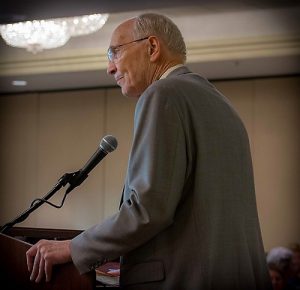 Chant II (taught by Dr. William Mahrt): A ten-week intermediate course in Gregorian chant for singers, directors, and lovers of the liturgy and its music. It will presume a rudimentary knowledge of reading Gregorian notation, and will proceed from the reading and singing of chants in Latin from the antiphons of the Divine Office to the chanted propers of the Mass.
Chant II (taught by Dr. William Mahrt): A ten-week intermediate course in Gregorian chant for singers, directors, and lovers of the liturgy and its music. It will presume a rudimentary knowledge of reading Gregorian notation, and will proceed from the reading and singing of chants in Latin from the antiphons of the Divine Office to the chanted propers of the Mass.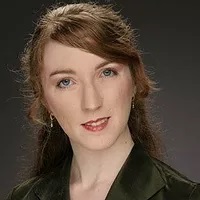 History of Sacred Music (Taught by Emily Lapisardi): A ten-week course which will be taught by Emily Lapisardi, director of music at the Catholic Chapel at the United States Military Academy (West Point, NY).
History of Sacred Music (Taught by Emily Lapisardi): A ten-week course which will be taught by Emily Lapisardi, director of music at the Catholic Chapel at the United States Military Academy (West Point, NY).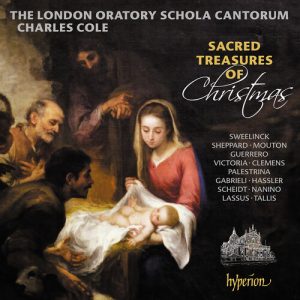
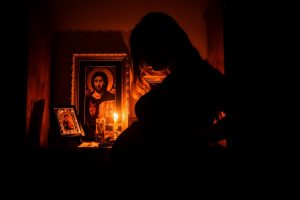
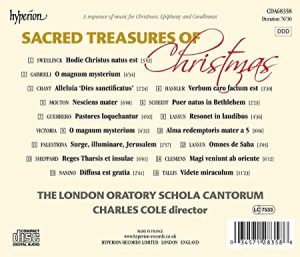 Charles Cole continued: “Through these recordings, the Schola seeks to bring to a wider audience the music which adorns the liturgies at the London Oratory. These motets have an important function within the liturgy and are not solely beautiful works of art to be appreciated in a removed context such as a museum or art gallery. Their sacred purpose, the way they are experienced by the boys who sing them, and the manner in which they are heard at the Oratory, are before all else within the liturgical context.”
Charles Cole continued: “Through these recordings, the Schola seeks to bring to a wider audience the music which adorns the liturgies at the London Oratory. These motets have an important function within the liturgy and are not solely beautiful works of art to be appreciated in a removed context such as a museum or art gallery. Their sacred purpose, the way they are experienced by the boys who sing them, and the manner in which they are heard at the Oratory, are before all else within the liturgical context.”